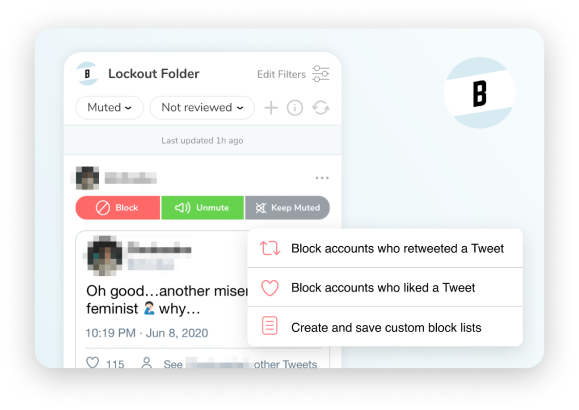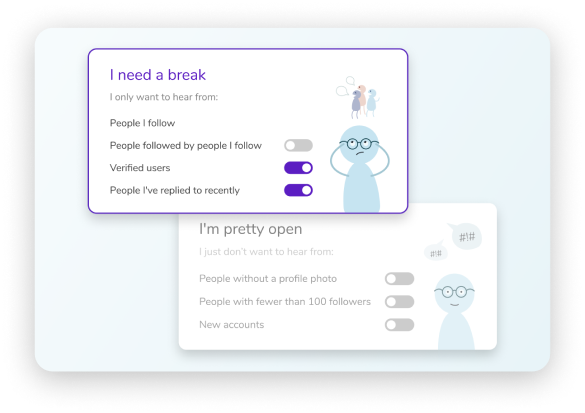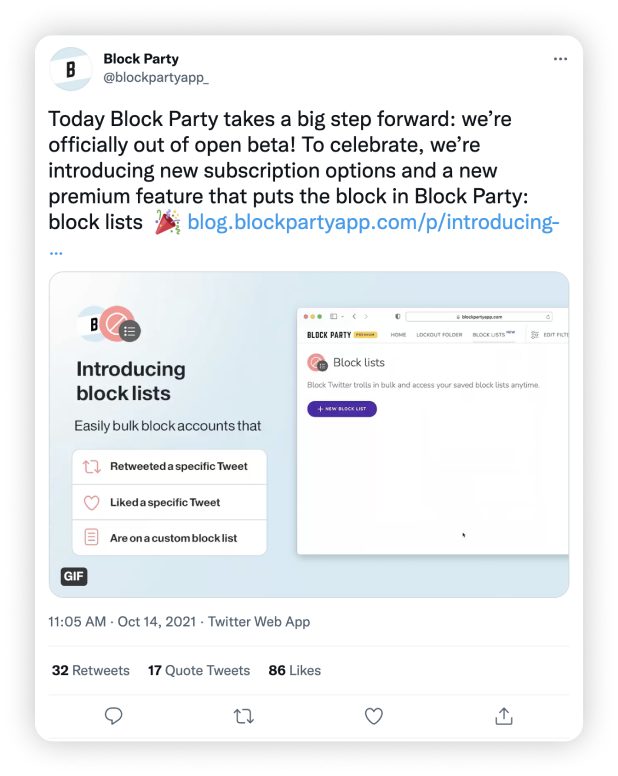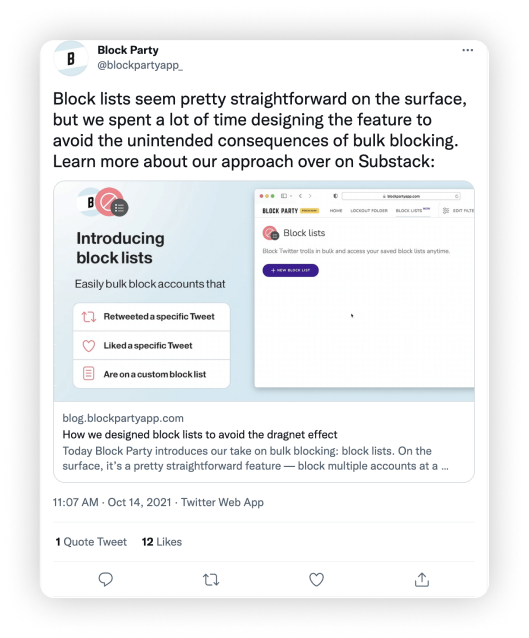Success story
Block Party
Building a safer online experience

Here's the tl;dr
Follow Tracy Chou’s journey to becoming the founder and CEO of Block Party — an anti-harassment tool — that allows users to take back control of their online experience. With the help of Twitter’s API, coupled with her own personal experiences, and software engineering background — Tracy was able to create a product that makes the internet a safer place for everyone.
Learn how Tracy Chou’s experience with online abuse inspired her to build a product that helps others in the same situation. Read about it here.

Challenge
When Tracy Chou — founder and CEO of Block Party — was first introduced to programming as a child, she loved it, but didn’t see it as an obvious career choice. Raised in Silicon Valley, to parents that were both software engineers, she was no stranger to the tech industry. Still, her entrance into the industry was reluctant. Little did she know, her first full-time role in tech would completely change her perspective.
Early in her career, Tracy discovered what she considers to be the true magic of programming: the satisfaction of creating and building something new.
In her role, Tracy was able to create content about what she knew best: her own experience.
The content Tracy created about being a woman in engineering, computer science, and tech paved the way for other women and people of color to reach out to her and express the similarities in their own realities. It was these conversations that stayed with Tracy throughout her career, even as she took on new roles at different companies.
According to Tracy, “experiencing what it was like to be the only [woman or person of color] on the team and in the room, and all the structural disadvantages [that come along with that]” propelled her to action. She had to say something.
Tracy soon published a blog post concerning the lack of diversity data in tech. The piece described the hypocrisy of being in a data-driven industry with no data on the diversity of its own workforce. It addressed the reluctance of many to admit that there was a problem. The post went viral.
The unfortunate side effect of garnering attention these days is the massive amount of online harassment that follows – Tracy now had to deal with the uglier side of the internet. After experiencing severe incidents of abuse, she went through the usual channels and reported the posts to social networks, but received no help. Frustrated, she posted screenshots of the abuse on her platforms, where her friends — many of whom worked in positions at these social networks — were appalled by the content. They escalated her experience within their companies, and got the posts taken down. And that’s when it hit Tracy. What about other people who experience online abuse and harassment who don’t have the same privilege of access to friends in the industry? Who was going to help them?
Solution
Tracy knew the situation would end differently for others, a realization that did not sit well with her. But as a software engineer, she knew what was needed: it was time to build something new. Quickly, she got to work and created Block Party — an anti-harassment tool that protects people against online abuse and provides solutions for user control, protection, and safety.
Tracy turned to Twitter to start realizing her vision. According to her, “the open environment that exposes its APIs for safety constructs, like muting and blocking, enabled me to build the product.” Users can sign up for Block Party, link their Twitter account, and set filtering options to clean up their mentions and replies, all while continuing to use Twitter as they normally would use the platform.
What differentiates Block Party from other companies trying to tackle spam and abuse is the human element. Block Party gives the user the power to deal with the content and any decision-making around that content at a time of their choosing. In addition, Tracy understood first hand the emotional toll it can take on an individual to have to revisit hateful, abusive, or harassing messaging directed at them, which is why Block Party allows users to invite a trusted friend(s) to review your muted/blocked content on your behalf. With Block Party, the user is at the center of the experience.
In Tracy’s view, both Block Party and Twitter allow people to participate more fully online. She sees Twitter as a strong partner for her company due to similar missions: enabling people to be a part of the online conversation. Since Twitter is where these conversations happen, where perspectives are shared, and where the entire globe is accessible — this is the place Block Party has the biggest impact.


Impact
Block Party offers users a safer online experience, where they can express themselves while minimizing the psychological impacts of online abuse and harassment. Recognizing that some voices are frequently silenced through abuse, particularly the voices of women and people of color, Block Party empowers everyone to participate in the public conversation by helping filter out the noise. As a result, this product helps keep diverse perspectives in the conversation — something that benefits society as a whole.
In Tracy’s words, “Block Party [gives] folks that level of customisation where [they] can have [choices], but there’s also a set of defaults that just make it easy to get going. ” Ultimately, Tracy turned lemons into lemonade. After experiencing the weight and impact of online abuse, she drew from her own expertise to create a solution. Through Block Party, she has empowered users to take back control of their online experience.

